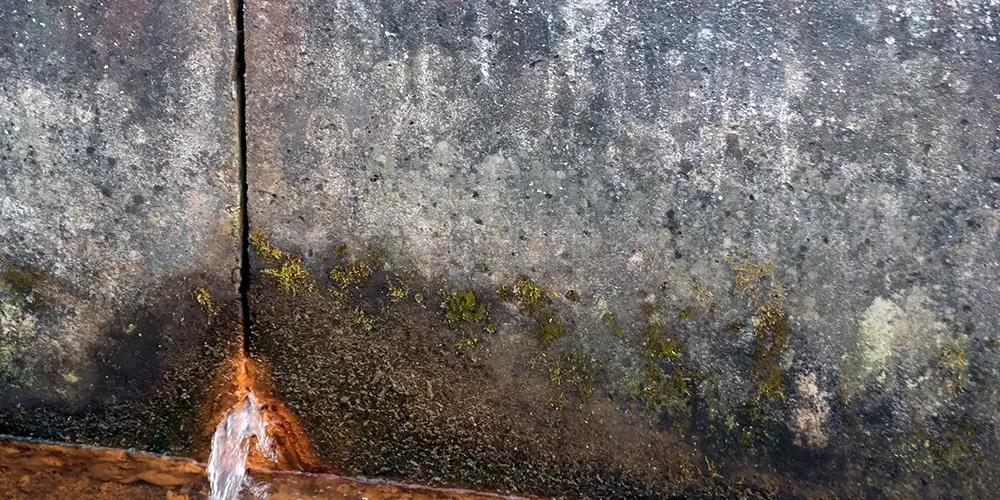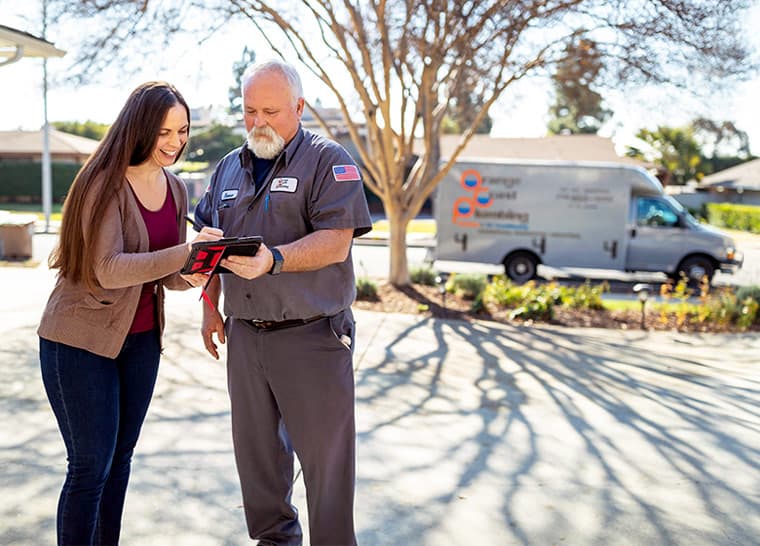If you’ve never heard of a slab leak, join millions of American homeowners.
They’re relatively uncommon but utterly devastating. Your introduction to slab leaks may be returning from a day at work to a flooded and ruined home. Yes, they can go from drip to deluge that fast and be catastrophic.
What Is a Slab Leak?
A slab leak is a “foundation leak.” It starts in the pipes in your home’s foundation, in or under the concrete “slab.”
This makes a slab leak especially difficult to detect and potentially expensive to repair. Newer plumbing techniques like cure-in-place and trenchless repair are cheaper than digging up your foundation, but if a leak has progressed too far, repiping may be the only option.
Flooding? Often due to a pinhole slab leak and eventual burst pipe.
Mold in walls? Usually the result of a slab leak close to drywall.
Early detection is critical. But did you know that many slab leaks are avoidable? How you treat your pipes has a lot to do with their condition. Vigilance, awareness, and regular plumbing inspections can prevent a slab leak from turning your life upside down.
Most slab leaks are caused by corrosion or a foundation shift — earthquake, heavy vibrations, or settling soil. Slab leaks in pristine pipes are rarer than sightings of the Yeti.
You can’t do much about your property’s shifting foundation, but you can do a lot about pipe corrosion, including hiring a plumber for trenchless repair. It’s expensive, but a drop in the bucket compared to a ruined foundation and runaway mold problem.
Steps for DIY Slab Leak Detection
Please remember that these are preliminary checks. Always hire a professional plumber for final confirmation and repairs.
- Monitor Your Water Bill: Check your monthly water bill for unusual spikes. If your usage hasn’t increased, but your bill has, it could indicate a hidden leak.
- Listen for Running Water: Turn off all faucets, appliances, and fixtures and listen closely. You might have a hidden leak if you hear running water when everything is off.
- Check for Warm or Damp Spots: Walk barefoot across your floors and feel for unusually warm or damp areas. Slab leaks can cause hot water to warm specific spots or moisture to seep through.
- Inspect for Cracks: Look for cracks in your walls or flooring. Foundation movement caused by water damage could signal a slab leak under your home.
- Watch for Low Water Pressure: If your water pressure drops unexpectedly, it could be due to water escaping through a pipe leak.
- Test with the Water Meter: Locate your water meter and turn off all water fixtures in your home. If the meter continues to move, this might point to a leak in your system.
These checks are only a starting point. If you suspect a slab leak, contact a licensed plumber immediately to assess the situation and perform necessary repairs. Acting quickly can prevent further structural damage and added costs.
6 Ways to Prevent a Slab Leak
1. Turn Down the Water Pressure
Do you hear a loud clunking when you turn the tap on or off? This means your water pressure is too high, and your pipes get shocked whenever you turn on the water, placing wear and tear on them.
Frequent shocks will erode corrosion-protective layers on your lines.
The good news? You can adjust the water pressure gauge in your home to lower the water pressure.
Also, consider installing a water pressure regulator on all incoming lines.
2. Insulate Your Pipes
Poorly insulated pipes under or around your slab may “sweat,” which eventually wears away corrosion-protective layers.
If you notice dampness, moisture, or rust near your pipes, hire a plumber to inspect and insulate them.
3. Control the pH of Your Water
Hardware stores and online retailers sell inexpensive pH testing kits. Every homeowner should invest in one and use it regularly.
The ideal pH for water is neutral, which is “7” on the scale.
Anything lower is acidic; anything higher is alkaline. Both are problems for plumbing and the further they move from the magical number 7, the bigger the problem.
Alkaline water eats away metal pipes; acidic water corrodes them.
A professional plumber can install a water conditioner to help stabilize the pH.
4. Reduce Your Water Hardness
Water hardness or softness refers to the mineral content in your water.
Hard water has more mineral volume; soft water has less. You’ll want a balance.
Too hard or soft water can corrode pipes and even contaminate your drinking water with metal deposits.
Orange County, like most of California, is notorious for hard water. A certified plumber can recommend a course of action and, if needed, install a water softener to balance mineral levels.
5. Schedule Regular Plumbing Inspections
Plumbers have special tools and equipment to detect corrosion and other problems inside your pipes.
Infrared cameras, probes, magnetometers, and acoustic devices are the most common tools to detect pipe damage.
Schedule an inspection every two years to keep your plumbing in the pink.
A tiny pinhole leak can grow into a torrent in minutes. And early intervention is much cheaper than cleaning up after a flood.
6. Install a Water Leak Detector with Smart Shut Off
Of all the ways to prevent a slab leak, an inline water leak detector is the newest, the coolest, and the most reliable.
This smart device learns your patterns and behavior, monitors water use, and shuts down the water system when it senses a problem. It can detect even the tiniest pinhole leaks!
And should you wonder if Orange Cost Plumbing installs these babies — yes, we do.
FAQs: Preventing a Slab Leak
Q: How can I tell if I have a slab leak in my home?
Signs of a slab leak can include unexplained increases in your water bill, the sound of running water when everything is turned off, damp or warm spots on the floor, and mold or mildew in areas near the foundation.
Q: What are the long-term consequences of a slab leak?
Left untreated, a slab leak can cause severe structural damage to your home, including foundation degradation. It can also lead to mold growth and compromise the integrity of your plumbing system.
Q: What should I do if I suspect a slab leak?
Act quickly. Turn off your water supply to prevent further damage, and contact a professional plumber who can inspect and determine the source of the leak.
Q: Can I detect a slab leak on my own?
While some signs can indicate a slab leak, such as damp spots or a sudden increase in water bills, it’s difficult to diagnose the problem accurately without professional tools. Hiring a plumber is the best way to confirm suspicions.
Q: How much does it typically cost to repair a slab leak?
The cost varies significantly depending on the severity of the leak and the repair methods. Simple fixes may range from a few hundred dollars, while more extensive repairs involving repiping can cost several thousand.
Q: Are there different types of slab leaks?
Yes. Hot water leaks occur in hot water lines, while cold water leaks happen in cold water lines. Each type presents its own set of challenges for detection and repair.
Q: Is it possible for a slab leak to ruin a foundation?
Water accumulation from a slab leak can erode soil under a foundation and compromise its integrity, resulting in costly long-term damage.
Q: What materials are most susceptible to slab leaks?
Copper, galvanized steel, and brass pipes are more susceptible to corrosion and eventual slab leaks. However, all types of pipes can develop leaks over time due to various factors, such as water pressure and mineral content.
Q: How often should I inspect my plumbing system for potential slab leaks?
We recommend a plumbing inspection every two years or more often if you suspect problems with your plumbing. Early detection can save you time and money and prevent extensive damage to your property.
Q: Can trenchless repair be used for slab leak repair?
Yes, trenchless repair methods such as pipe relining or pipe bursting can often repair slab leaks without invasive excavation. These newer methods can save time, money, and disruption to your property.
Q: How can I tell if my plumbing system is starting to fail?
Frequent clogs, discolored water, persistent dripping sounds, or a sudden decrease in water pressure can be signs of potential plumbing failure. If you experience these issues, call for a professional assessment.
Q: Is slab leak insurance coverage available?
Maybe. Some policies may have exclusions based on maintenance or pre-existing conditions, so review your coverage carefully.


